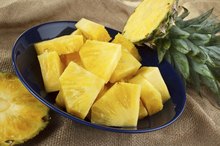What Fruits Contain Protease Enzymes?
Protease enzymes break down or change the composition of proteins or peptides. In addition to being important to the process of digestion and metabolism, some protease enzymes are thought to improve inflammation and strengthen the immune system, according to New York University Langone Medical Center. Although protease enzymes can be taken in supplement form and may be added to certain foods, these enzymes also occur naturally in certain fruits. If you are concerned about inflammation, digestive problems or any other health condition, consult your doctor.
Papaya
Papaya is a very potent source of the protease enzyme papain, as well as a similar enzyme called chmyopapain. These enzymes have an anti-inflammatory mechanism, and may also play a role in healing burns, according to a 2013 issue of the "Journal of Medicinal Plants Studies." Although papain is thought to be helpful in relieving some of these health problems, it is not known to be a medical cure for any condition.
Pineapple
Foods Containing Protease Enzymes
Learn More
Pineapple is an excellent source of the protease-containing compound bromelain, which is thought to aid in digestion as well as in reducing blood clotting and inflammation, according to MedlinePlus.com. In addition, bromelain may have the ability to reduce the growth of certain types of tumors. However, MedlinePlus emphasizes that these benefits have not been scientifically proven, and that pineapple is not a medical treatment for any condition. Bromelain is frequently extracted from the core or stem of the pineapple for use in supplements.
- Pineapple is an excellent source of the protease-containing compound bromelain, which is thought to aid in digestion as well as in reducing blood clotting and inflammation, according to MedlinePlus.com.
Kiwi
Kiwi fruit contains actinidin, a proteolytic enzyme with activity similar to papain, according to Drugs.com. Actinidin comprises half of kiwi's soluble protein content. In some cases, actinidin may be an allergen, and is sometimes related to a hypersensitive reaction within minutes of eating kiwi. Kiwi fruit juice is sometimes used as a meat tenderizer, Drugs.com reports, due in part to the proteolytic activity of actinidin.
- Kiwi fruit contains actinidin, a proteolytic enzyme with activity similar to papain, according to Drugs.com.
- Kiwi fruit juice is sometimes used as a meat tenderizer, Drugs.com reports, due in part to the proteolytic activity of actinidin.
Related Articles
References
- New York University Langone Medical Center: Proteolytic Enzymes
- Journal of Medicinal Plants Studies: Traditional and Medicinal Uses of Carica papaya
- Drugs.com: Complete Kiwi Fruit Information from Drugs.com
- Bromelain. University of Maryland Medical Center. http://www.umm.edu/health/medical/altmed/supplement/bromelain.
- Lipase. University of Maryland Medical Center. http://www.umm.edu/health/medical/altmed/supplement/lipase.
- Zhou Q, Melton DA. Pancreas regeneration. Nature. 2018;557(7705):351–358. doi:10.1038/s41586-018-0088-0
- Rathnavelu V, Alitheen NB, Sohila S, Kanagesan S, Ramesh R. Potential role of bromelain in clinical and therapeutic applications. Biomed Rep. 2016;5(3):283–288. doi:10.3892/br.2016.720
- de la Iglesia-García D, Huang W, Szatmary P, et al. Efficacy of pancreatic enzyme replacement therapy in chronic pancreatitis: systematic review and meta-analysis. Gut. 2017;66(8):1354–1355. doi:10.1136/gutjnl-2016-312529
- Penn State Hershey Medical Center. Lipase. Review June 2015.
- Papaya. MedlinePlus. Reviewed March 2019.
- Lactose Intolerance. National Institute of Diabetes and Digestive and Kidney Diseases.
- Bromelain. University of Maryland Medical Center.
- Lipase. University of Maryland Medical Center.
Resources
Writer Bio
Jennifer Byrne is a freelance writer and editor specializing in topics related to health care, fitness, science and more. She attended Rutgers University. Her writing has been published by KidsHealth.org, DietBlogTalk.com, Primary Care Optometry News, and EyeWorld Magazine. She was awarded the Gold Award from the American Society of Healthcare Publication Editors (ASHPE), 2007, and the Apex Award for Publication Excellence.









